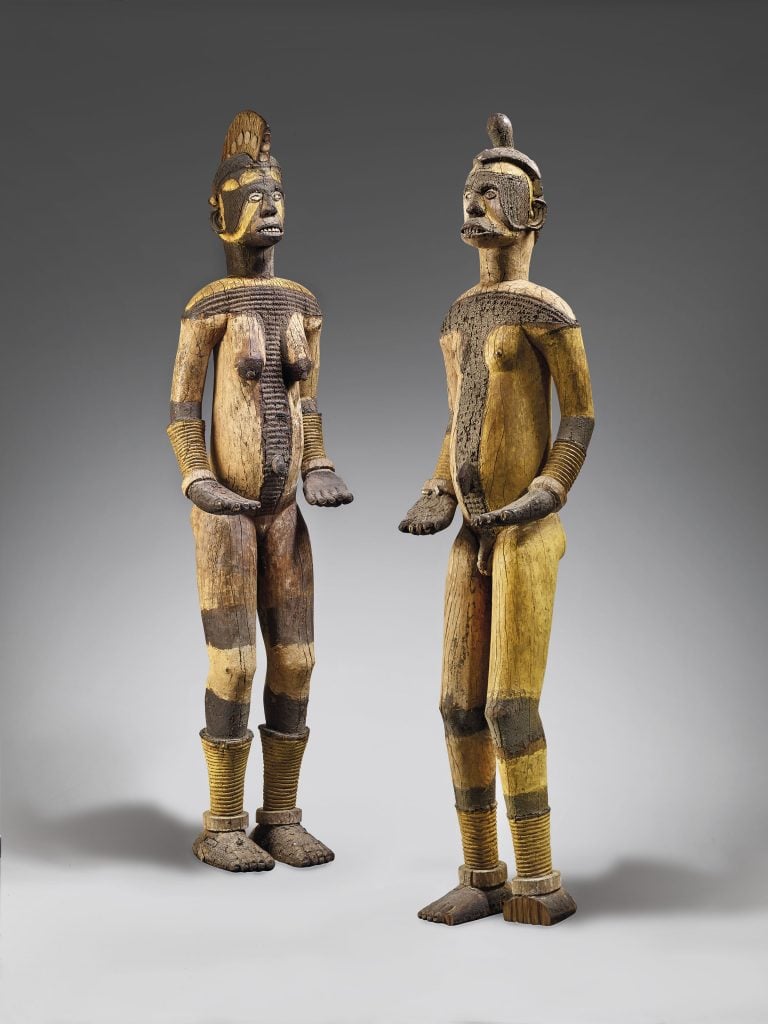Auctions
Christie’s Paris Sells Two ‘Sacred Sculptures’ From Nigeria, Despite Protests From Scholars and Nigerian Heritage Authorities
Professor Chika Okeke-Agulu and others have criticized the sale using the hashtag #BlackArtMatters.

Professor Chika Okeke-Agulu and others have criticized the sale using the hashtag #BlackArtMatters.

Taylor Dafoe

The sale of two sacred Nigerian statues went ahead at Christie’s Paris showroom this afternoon despite accusations that the objects were looted during the African country’s civil war.
Packaged as one lot, the pair of sculptures from the Igbo people of Nigeria, which depicted deities called alusi, was estimated to go for €250,000–€350,000 ($283,000–$396,000) at Christie’s Arts d’Afrique, d’Océanie et d’Amérique du nord sale. On Monday in the French capital, they fell short of that mark, selling for €212,500 ($239,000) after fees.
Chika Okeke-Agulu, a member of the Igbo tribe and an influential professor of indigenous, modern, and contemporary African and African Diaspora art history Princeton University, opposed the sale as soon as it was announced. On Instagram, he has said that the “artworks are stained with the blood of Biafra’s children,” arguing that Jacques Kerchache, the prominent French collector of African art who owned the pieces, exploited the Nigerian civil war in the late 1960s for personal gain.
“The art market buys and sells this material, but they do not respect or reckon with the societies they were taken from,” Okeke-Agulu told Artnet News in a statement after the sale. “Christie’s sale of the alusi figures today makes that abundantly clear.”
Kerchache, who died in 2001, has been described as “a Gallic Indiana Jones.” Among other things, he is remembered as the driving force behind the opening of the Musée du Quai Branly, which is dedicated to the arts of Oceania, Asia, Africa, and the Americas.
Okeke-Agulu was one of over 3,300 to sign an online petition demanding Christie’s stop the auction. The document framed the issue through the lens of Black Lives Matter movement, using the hashtag #BlackArtsMatter. “We must not forget that it is not just the black body, but also black culture, identity and especially art that is being misappropriated,” it read.
Nigeria’s National Commission for Museums and Monuments also called on the auction house to pull the statues and four other lots from the sale, demanding proof of the objects’ provenance. The Commission alleged that the removal of the items in question may have violated the UNESCO convention of 1954, which protects cultural heritage during armed conflict.
Despite the criticism, Christie’s decided to move forward with the sale. “These objects are being lawfully sold having been publicly exhibited and previously sold over the last decades prior to Christie’s involvement,” a representative from the company told the Associated Press in a statement.
“It is our understanding Mr. Kerchache never went to Nigeria in 1968/69 which suggests local agents were involved in initial trading, likely to Cameroon before shipment to Europe,” an unnamed source from the auction house told CNN.
“Christie’s is in the business of making money, and I understand that,” Okeke-Agulu wrote to Artnet News. “But as they did with the alusi figures from Nigeria, they would fudge the provenance of of the sculptures in their bid to claim they were legally acquired from their original owners. Their claim that the alusi figures came from a place that was not at war, when their own information says that Jacques Kerchache acquired these objects in 1968-69 during the Biafran War of 1967-70 shows how arrogant, and perhaps willfully ignorant, they are of Nigeria’s history.”